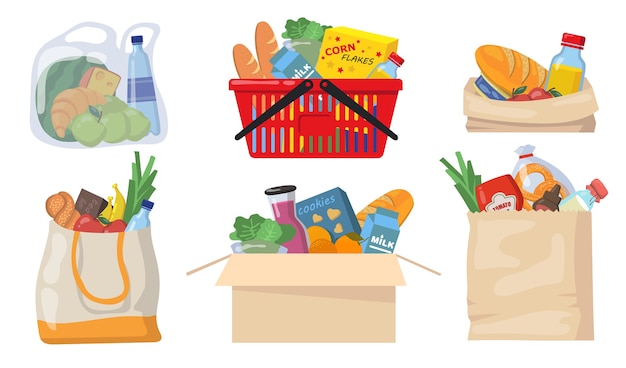As countries are taking stronger measures to contain the spread of COVID-19, Healthy individuals, as well as those showing acute respiratory disease symptoms, are being requested to stay at home. Good nutrition is crucial for health, particularly in times when the immune system might need to fight back. Limited access to fresh foods may compromise opportunities to continue eating a healthy and varied diet. For optimal health, it is also important to remain physically active. To support healthy individuals in staying physically active while at home, WHO/Europe has developed specific guidance for periods of quarantine, including tips and examples of home-based exercises. In order to support individuals in eating healthy food WHO/Europe has prepared a set of general tips, a list of "best food buys" and a few examples of recipes for inspiration.
Photo from https://www.freepik.com Website
Be prioritize fresh products. Use fresh products, especially fruits, vegetables and reduced-fat dairy products continue to be available, prioritize these over non-perishables. Frozen fruits and vegetables can also conveniently be used over longer periods of time and often have a similar nutrient profile to fresh foods. To avoid food waste, you may consider freezing any leftovers for another meal. Prioritized, particularly from reliable businesses following strict food hygiene requirements. For food delivery and transportation, it is important to keep food at safe temperatures (below 5 °C or above 60 °C). Keeping in mind that these services might be overwhelmed, you might want to consider exploring what is available in your area. Food safety is a prerequisite for food security and a healthy diet. Only safe food is healthy food. When preparing food for yourself and others, it is important to follow good food hygiene practices to avoid food contamination and foodborne diseases.
The key principles of good food hygiene include: keep your hands, kitchen and utensils clean separate raw and cooked food, especially raw meat and fresh produce cook your food thoroughly keep your food at safe temperatures, either below 5 °C or above 60 °C; and use safe water and raw material. Limit your salt intake WHO recommends consuming less than 5 g of salt per day. Limit your sugar intake WHO recommends that ideally less than 5% of total energy intake for adults should come from free sugars (about 6 teaspoons). If you crave something sweet, fresh fruit should always be the priority. Frozen fruits, canned fruits in juice rather than syrup, and dried fruits with no added sugar are also good options. When other dessert options are chosen, ensure that they are low in sugar and consume small portions.
Watch out for low fat options, as these are often high in added sugars. Limit the amount of sugar or honey added to foods and avoid sweetening your beverages. Limit your fat intake WHO recommends limiting total fat intake to less than 30% of total energy intake, of which no more than 10% should come from saturated fat. To achieve this, opt for cooking methods that require less or no fat, such as steaming, grilling or sautéing instead of frying foods. Reduce foods such as red and fatty meats, butter and full-fat dairy products, palm oil, coconut oil, solid shortening and lard. processed and fried foods, like doughnuts and baked goods – including biscuits, pie crusts, frozen pizzas, cookies, crackers and margarines that include partially hydrogenated fat. Consume enough fibre vegetables, fruit, pulses and wholegrain foods in all meals. Wholegrains foods include oats, brown pasta and rice, quinoa and whole-wheat bread and wraps, rather than refined grain foods such as white pasta and rice, and white bread.
Stay hydrated. Drinking water instead of sugar-sweetened beverages is a simple way to limit your intake of sugar and excess calories. Avoid alcohol or at least reduce your alcohol consumption.--- Alcohol consumption is also known to increase symptoms of depression, anxiety, fear and panic – symptoms that can intensify during isolation and self-quarantine although you might think that it will help you deal with stress. Under no circumstances should you consume any type of alcoholic products as a preventive or treatment measure against COVID-19. Increased time at home during this period may also present new opportunities to involve children in cooking healthy foods, which can help them acquire important life skills that they can carry into adulthood.
We need to create lifestyle habits that allow us to do that while acknowledging the pressures. So it’s matter of creating healthy habits. Let’s not shoot high that we are incapable of accomplishing our goals. Let’s make realistic to preserve our body healthy and that of our family and have that positive thinking and think that this pandemic is just as our motivation to become motivated to double down on healthy practice on how to enhance our gut health…




No comments:
Post a Comment